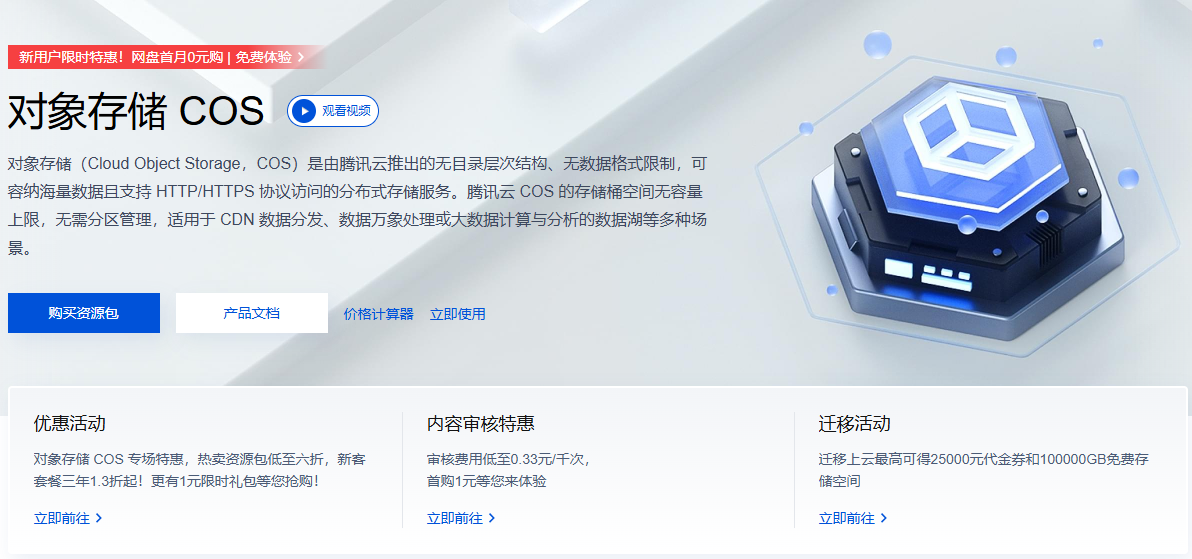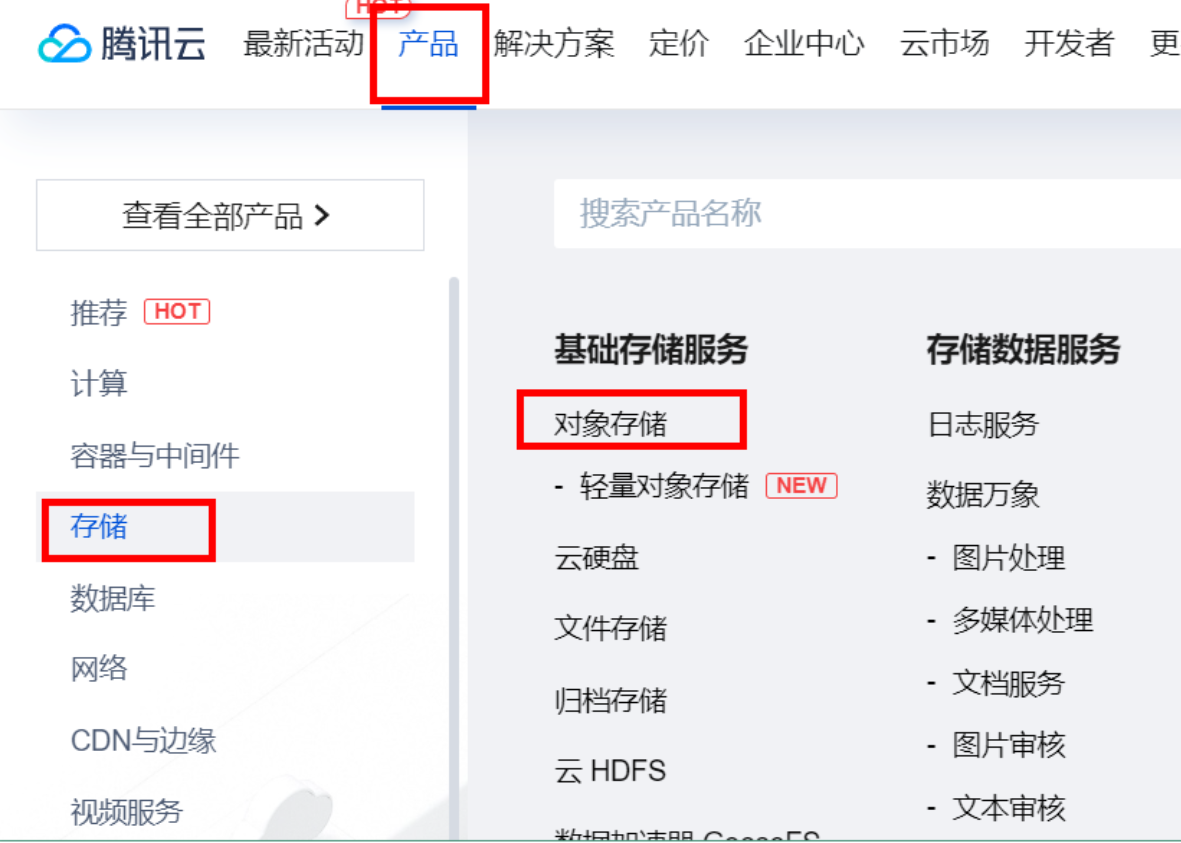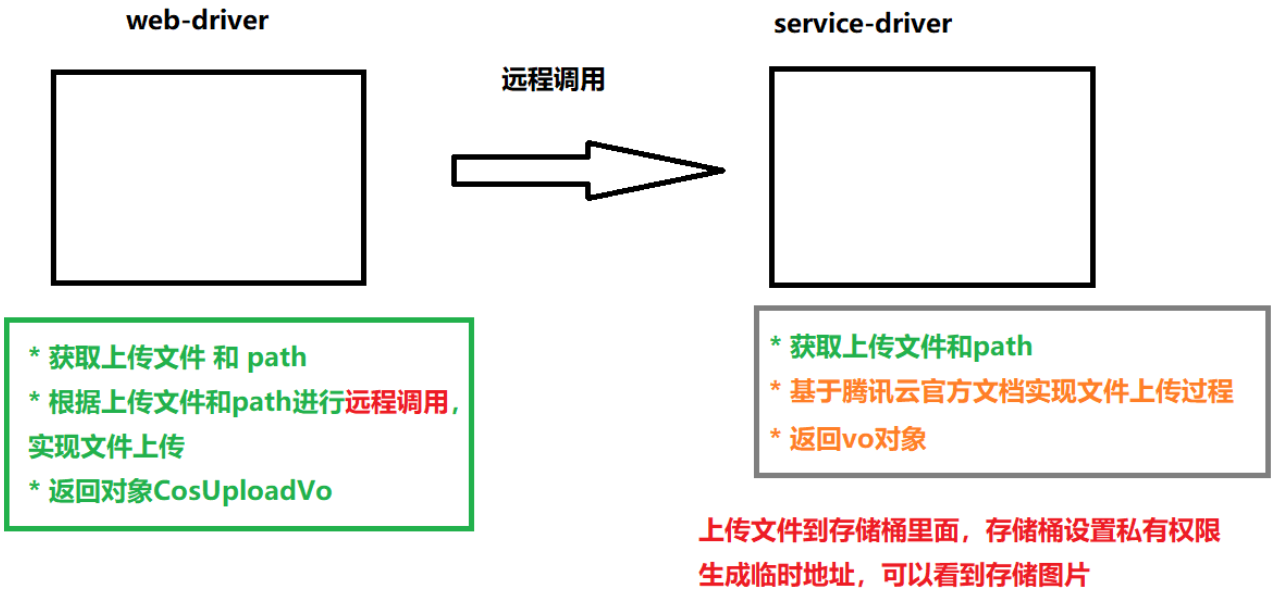腾讯云对象存储服务COS
目录
前置操作:
service-driver远程上传文件:
司机端web接口:

前置操作:
首先进入腾讯云官网:AI驱动 智领未来_腾讯云![]() https://cloud.tencent.com/act/pro/warmup202506?fromSource=gwzcw.9884755.9884755.9884755&utm_medium=cpc&utm_id=gwzcw.9884755.9884755.9884755&msclkid=332664077e8117a4b4900c96dd1fe741#LH
https://cloud.tencent.com/act/pro/warmup202506?fromSource=gwzcw.9884755.9884755.9884755&utm_medium=cpc&utm_id=gwzcw.9884755.9884755.9884755&msclkid=332664077e8117a4b4900c96dd1fe741#LH

-
项目基于腾讯云对象存储服务COS,存储认证相关资料(身份证、驾驶证等保密信息)
-
要使用腾讯云对象存储服务,首先进行开通,注册腾讯云之后,开通就可以了
-
使用对象存储服务,可以在控制台里面进行操作,也可以使用Java代码进行操作,这些操作,腾讯云官方提供详细文档说明,按照文档就方便进行操作
下面是官方文档:Java版 对象存储 快速入门_腾讯云![]() https://cloud.tencent.com/document/product/436/10199
https://cloud.tencent.com/document/product/436/10199
步骤详情:

首先引入依赖:
<dependency><groupId>com.qcloud</groupId><artifactId>cos_api</artifactId>
</dependency>之后在配置文件配置相关信息:
tencent:cloud:secretId: **************************secretKey: *****************************region: ap-beijing # 根据自己的地区选择bucketPrivate: daijia-private-1307503602 # 根据自己的bucket名称选择随后创建配置类:
import lombok.Data;
import org.springframework.boot.context.properties.ConfigurationProperties;
import org.springframework.stereotype.Component;@Data
@Component
@ConfigurationProperties(prefix = "tencent.cloud")
public class TencentCloudProperties {private String secretId; // 腾讯云API密钥IDprivate String secretKey; // 腾讯云API密钥Keyprivate String region; // 存储桶地域(可选值:ap-beijing(北京)、ap-shanghai(上海)等)private String bucketPrivate; // 私有存储桶名称
}service-driver远程上传文件:
在service-driver中定义一个远程上传接口:
@Slf4j
@Tag(name = "腾讯云cos上传接口管理")
@RestController
@RequestMapping(value="/cos")
@SuppressWarnings({"unchecked", "rawtypes"})
public class CosController {@Autowiredprivate CosService cosService;@Operation(summary = "上传")@PostMapping("/upload")public Result<CosUploadVo> upload(@RequestPart("file") MultipartFile file, @RequestParam("path") String path) {CosUploadVo cosUploadVo = cosService.upload(file,path);return Result.ok(cosUploadVo);}}在Service中:
步骤详情:
- 初始化用户的身份信息,并设置bucket的地域与COS地域。
- 设置文件元数据信息(大小,编码格式,内容类型)。
- 向bucket保存文件(可修改uploadPath,当前路径为"/driver/auth/0o98754.jpg"),随后调用cosClient.putObject()上传文件后,cosClient.shutdown()关闭。【cosClient为自定义的远程调用方法(封装上传文件)】
- 若想要让其上传文件地址临时有效,则需获取临时签名URL:
(1)获取cosClient对象,定义请求的HTTP方法(下载GET,删除DELETE),通过cosClient.generatePresignedUrl()方法获取一个临时的URL。
(2)将该URL设置并返回。
@Slf4j
@Service
@SuppressWarnings({"unchecked", "rawtypes"})
public class CosServiceImpl implements CosService {@Autowiredprivate TencentCloudProperties tencentCloudProperties;// 创建私有存储桶的COS客户端private COSClient getPrivateCOSClient() {COSCredentials cred = new BasicCOSCredentials(tencentCloudProperties.getSecretId(), tencentCloudProperties.getSecretKey());// 设置 bucket 的地域, COS 地域Region region = new Region(tencentCloudProperties.getRegion());ClientConfig clientConfig = new ClientConfig(region);// 这里建议设置使用 https 协议clientConfig.setHttpProtocol(HttpProtocol.https);// 生成 cos 客户端。COSClient cosClient = new COSClient(cred, clientConfig);return cosClient;}@Overridepublic CosUploadVo upload(MultipartFile file, String path) {// 调用上面创建私有存储桶的COS客户端的方法COSClient cosClient = this.getPrivateCOSClient();//文件上传//元数据信息ObjectMetadata meta = new ObjectMetadata();meta.setContentLength(file.getSize());meta.setContentEncoding("UTF-8");meta.setContentType(file.getContentType());//向存储桶中保存文件String fileType = file.getOriginalFilename().substring(file.getOriginalFilename().lastIndexOf(".")); //文件后缀名String uploadPath = "/driver/" + path + "/" + UUID.randomUUID().toString().replaceAll("-", "") + fileType;// 假设传输文件为01.jpg// 在腾讯云的路径就是"/driver/auth/0o98754.jpg"PutObjectRequest putObjectRequest = null;try {// bucket名称+文件传输路径+文件输入流+元数据对象putObjectRequest = new PutObjectRequest(tencentCloudProperties.getBucketPrivate(),uploadPath,file.getInputStream(),meta);} catch (IOException e) {throw new RuntimeException(e);}// 标准存储putObjectRequest.setStorageClass(StorageClass.Standard);PutObjectResult putObjectResult = cosClient.putObject(putObjectRequest); // 腾讯云COS官方SDK上传文件cosClient.shutdown();//业务逻辑://返回vo对象CosUploadVo cosUploadVo = new CosUploadVo();cosUploadVo.setUrl(uploadPath);//调用方法获取临时URLString imageUrl = this.getImageUrl(uploadPath);cosUploadVo.setShowUrl(imageUrl);return cosUploadVo;}// 获取临时签名URL@Overridepublic String getImageUrl(String path) {if(!StringUtils.hasText(path)) return "";//获取cosclient对象COSClient cosClient = this.getCosClient();//GeneratePresignedUrlRequestGeneratePresignedUrlRequest request =new GeneratePresignedUrlRequest(tencentCloudProperties.getBucketPrivate(),path, HttpMethodName.GET);//设置临时URL有效期为15分钟Date date = new DateTime().plusMinutes(15).toDate();request.setExpiration(date);//调用方法获取URL url = cosClient.generatePresignedUrl(request);cosClient.shutdown();return url.toString();}
}feign接口:
/*** 上传* @param file* @param path* @return*/
@PostMapping(value = "/cos/upload", consumes = MediaType.MULTIPART_FORM_DATA_VALUE)
Result<CosUploadVo> upload(@RequestPart("file") MultipartFile file, @RequestParam("path") String path);司机端web接口:
首先编写Controller:
@Autowired
private CosService cosService;@Operation(summary = "上传")
@GuiguLogin
@PostMapping("/upload")
public Result<CosUploadVo> upload(@RequestPart("file") MultipartFile file, @RequestParam(name = "path", defaultValue = "auth") String path) {return Result.ok(cosService.upload(file, path));
}之后进行远程调用上传接口:
@Override
public CosUploadVo upload(MultipartFile file, String path) {return cosFeignClient.upload(file, path).getData();
}